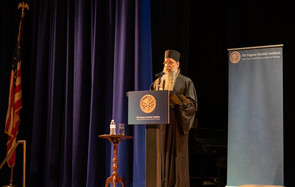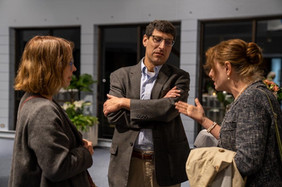Who Was Mary? The Spring PPI Lecture by Dr Mary Cunningham
- Tikhon Pino

- Apr 26, 2023
- 3 min read

On Friday, April 21, 2023 — the Friday of Bright Week and the feast of the Mother of God of the Life-Receiving Spring — the Pappas Patristic Institute organized a public lecture entitled “Who was Mary? The Mother of God Seen through Byzantine Eyes,” given by Professor Mary Cunningham, Honorary Associate Professor of Historical Theology at the University of Nottingham. The lecture, which took place at the Maliotis Cultural Center of Hellenic College/Holy Cross Greek Orthodox School of Theology, was well attended and followed by a celebratory paschal reception.
Professor Cunningham is one of the world’s leading authorities on the Mother of God in the Byzantine and Orthodox Christian tradition. As the founder and director of the Orthodox Theological Research Forum, she organized ten annual conferences between 2003 and 2013. During her tenure as a Research Fellow at the Institute of Archeology and Antiquity at the University of Birmingham, she directed a major research project on the Virgin Mary in Byzantium, investigating liturgical texts written in honor of the Theotokos, especially festal sermons and hymns.

Among her many publications is Gateway of Life: Thinking on the Mother of God, an excellent short introduction to the Mother of God in the Orthodox Church, published by St Vladimir’s Seminary Press in 2015. In 2019, she edited a volume of papers called The Reception of the Virgin in Byzantium: Marian Narratives in Texts and Images, published by Cambridge University Press. This followed an earlier edited volume, The Cult of the Mother of God in Byzantium: Texts and Images, published by Ashgate in 2011. In 2021, she published a major monograph with Cambridge University Press called The Virgin Mary in Byzantium: Hymns, Homilies, and Hagiography, which covers the period from 400-1000.

Professor Cunningham has also distinguished herself as a translator of Marian texts, including Wider than Heaven: Eighth-Century Byzantine Homilies on the Mother of God, published in 2008. This is a collection of translations of homilies on the Mother of God by St John of Damascus, St Andrew of Crete, St Germanos of Constantinople, and other middle Byzantine writers. Many of these homilies were not previously available in English, and they provide the reader with a fascinating look into middle Byzantine liturgical devotion to the Theotokos.
Most recently, Dr Cunningham has completed a translation of the Life of Mary, the Theotokos, written in the late eighth or early ninth century by the monk Epiphanios of the Kallistratos Monastery in Constantinople. The Life, which will be published by Liverpool University Press in June of this year, is the earliest attempt by a Greek-speaking author to provide a full-length biography of Mary, from the time of her conception to her death and translation to heaven.

To appreciate Professor Cunningham’s contribution to the study of Mary, it is helpful to recall that, prior to her work, scholarship on the Mother of God was heavily focused on the late-antique or early Byzantine period,[1] with special attention to the Third Ecumenical Council, which met in Ephesus in 431, where the Mother of God officially received the title of “Theotokos.” However, there was comparatively little interest in the Mother of God in the middle and later Byzantine periods. The middle Byzantine period, which begins with the defeat of Iconoclasm and the Restoration of Icons in 843, was a time of significant developments in Orthodox theological thinking about the Mother of God, impacting liturgy, hymnology, homiletics, iconography, and other aspects of Church life. Professor Cunningham’s pioneering work has been vital in opening up this fascinating period for students and scholars,

Her lecture, which may be viewed here and just below, focuses on three topics: (1) The role of Mary as “Theotokos” (“God-bearer”) in the Incarnation of God the Word; (2) Mary as defender and intercessor for the city of Constantinople; and (3) Mary as a model of ascetic behavior, an ideal type of the “hesychast,” and a paradigm for all Christians, especially women.
[1] The late-antique or early Byzantine period, a time of transition from classical antiquity to the Middle Ages, roughly spans the late third century through the seventh century.






























コメント